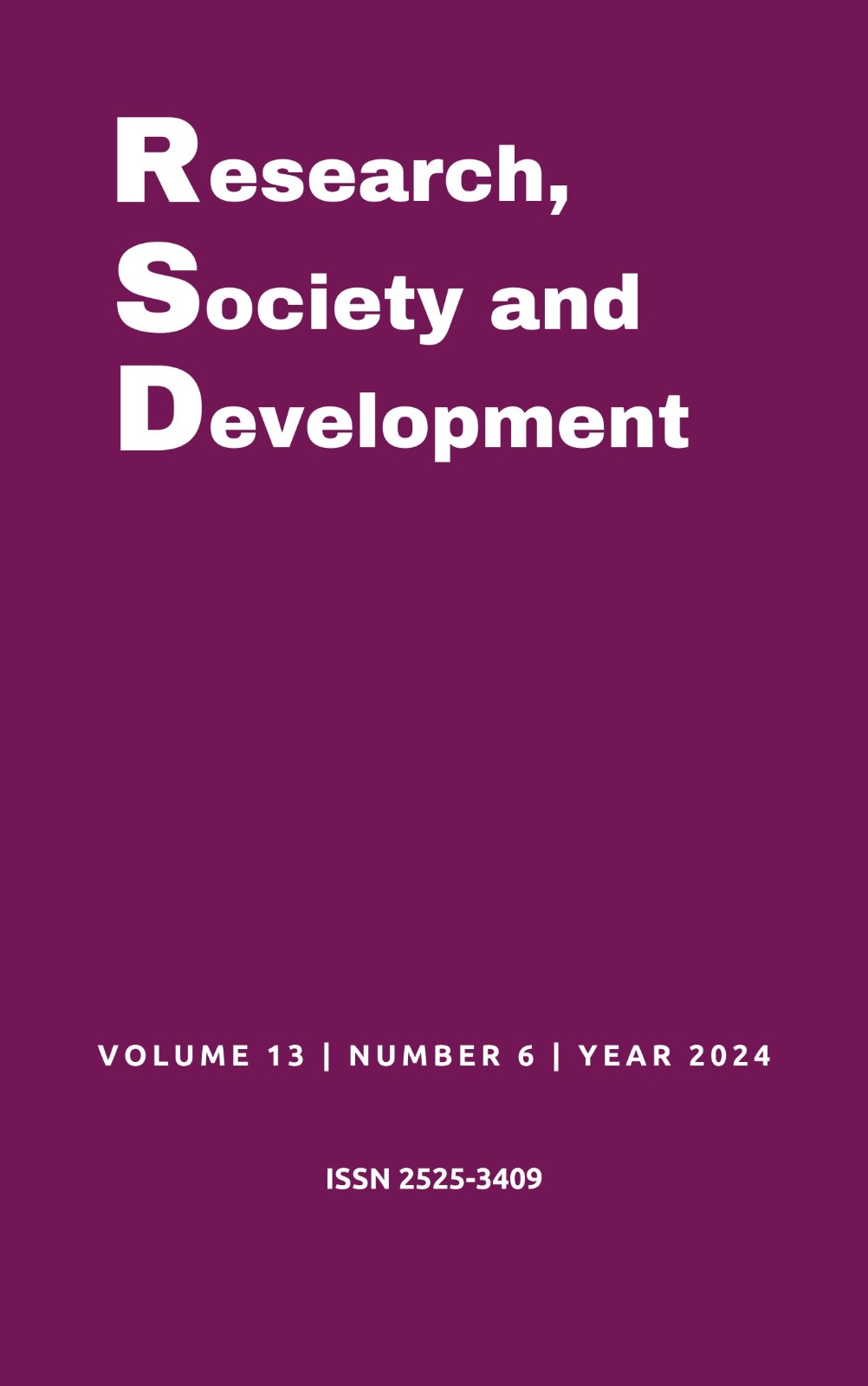A importância da nutrição para o controle de doenças autoimunes
DOI:
https://doi.org/10.33448/rsd-v13i6.46128Palavras-chave:
Doença autoimune, Dieta, Imunidade.Resumo
Estudos sugerem que as doenças autoimunes são acarretadas por um descontrole no sistema imunológico e que o seu desenvolvimento está relacionado com fatores multifatoriais, como genéticos e ambientais. A relação da nutrição e as respostas imunes sistêmicas, atraiu atenção considerável como estratégia no controle das doenças autoimunes. Diante do exposto, este trabalho teve por objetivo verificar o efeito da terapia nutricional no controle de inflamações crônicas imunossupressoras, a partir de uma revisão de literatura, foram utilizados trabalhos acadêmicos, revistas com a temática do trabalho e bases científicas como ScienceDirect, PubMed, MDPI, considerando artigos publicados entre 2009 - 2024, nas línguas portuguesa e inglesa, sendo excluídos aqueles que priorizavam exercício físico, fármacos ou outros tratamentos que não estivessem relacionados à alimentação e nutrição. A saúde e o bom funcionamento da microbiota intestinal, uma alimentação específica que possa melhorar os sintomas inflamatórios das doenças imunossupressoras, suplementação com ácidos graxos ômega 3, vitamina D, C e zinco podem trazer benefícios para a imunidade e melhorar os sintomas da patologia.
Referências
Amorim, L., (2018). Análise das interações entre alimentação e microbiota intestinal em portadores de doenças autoimunes. 25 f. Monografia (Graduação em Nutrição) – Faculdade de Ciências da Educação e Saúde, Centro Universitário de Brasília.
Bitencourt, R. M., & Coan, F. (2019). O uso de vitamina D em doenças autoimunes: Revisão sobre o potencial terapêutico. Revista Inova Saúde, 9(1), 1-22.
Calder, P., & Yaqoob, P. (2009). UnderstandingOmega-3 Polyunsaturated Fatty Acids. PostgraduateMedicine, 121(6), 148–157.
Costa, A., Silva- Júnior, A., Pinheiro, A. (2019). Fatores associados a etiologia e patogênese das doenças autoimunes. Arquivos Catarinenses de Medicina, 48(2), 92-106.
Damasceno, S., Fernandes, R., Almeida, S. (2023). A importância da nutrição integrativa em pacientes com doenças autoimunes. Research, Society and Development, 12(6), 16612642156. http://dx.doi.org/10.33448/rsd-v12i6.42156
Diamanti, A., et al. (2020). Impact of Mediterranean Diet on Disease Activity and Gut Microbiota Composition ofRheumatoid Arthritis Patients. MDPI JournalMicroorganisms, Switzerland, 8(12), 1-14.
Farias, A. O., Melo, A., Ferreira, J. (2021). A importância da alimentação saudável para portadores de doença autoimune. Research, Society and Development, 10(12), 1-7.
Fernandez, J. (2022). Doenças autoimunes. Manual MSD. https://www.msdmanuals.com/pt-br/casa/doen%C3%A7as imunol%C3%B3gicas/rea%C3 %A7%C3%B5es-al%C3%A9rgicas-e-outras-doen%C3%A7as-relacionadas-%C3%A0-hipersensibilidade/doen%C3%A7as-autoimunes
Freire, R., et al. (2019). Human gut derived-organoidsprovide model to study gluten response and effects of microbiota-derived molecules in celiac disease, ScientificReports, 9(7029). https://doi.org/10.1038/s41598-019-43426-w
Gesto, D. (2014). Ácidos Gordos. Revista de Ciência Elementar, Universidade de Porto, PT, 2(4), 2-3. doi.org/10.24927/rce2014.278
Jiménez- Chillarón, J. C., et al. (2012). The role of nutrition on epigenetic modifications and their implications on health. Biochimie, 94(11), 2242-2263. doi: 10.1016/j.biochi.2012.06.012.
Mattos, P. C. (2015). Tipos de revisão de literatura. Unesp, 1-9.
Mota, T. S. (2022). A importância da nutrição nas doenças autoimunes e em especial no lúpus eritematoso sistêmico. Trabalho de conclusão de curso (Graduação em Nutrição) - Faculdade de São Lourenço.
Moudgil, K., & Venkatesha, S. (2022) The Anti-Inflammatory and Immunomodulatory Activities ofNatural Products to Control Autoimmune Inflammation. International Journal of Molecular Sciences, 24(95), 1- 32. doi: 10.3390/ijms24010095.
Nelson, D., & Cox, M. (2014) Princípios de Bioquímica de Lehninger. (6a ed). Porto Alegre, RS: Artmed.
Oliveira, D. H. S., Silva, M. I. O., Fonseca, R. G. & Ferreira, J. C. S. (2021). A importância de uma alimentação saudável como forma de aumento da imunidade através das vitaminas e minerais. Research, Society and Development, 10(12), e103101220305.
Perbelin, A. S. , Silva, C. V. (2019). O papel da microbiota como aliada no sistema imunológico. Mudi, 23(3), 345-358.
Pereira, C. C. (2022). Alimentação e microbiota intestinal como potencializador da imunidade. Trabalho de Conclusão de Curso apresentado à Universidade de Cuiabá.
Reis, F., & Macagnan, F. (2021) Micronutrientes: uma revisão sobre a sua relação com o sistema imunológico, biodisponibilidade e fortificação nos alimentos. https://repositorio.ifsc.edu.br/handle/123456789/2290
Soares, E., et al. (2015) Compostos bioativos em alimentos, estresse oxidativo e inflamação: uma visão molecular da nutrição. Revista Hospital Universitário Pedro Ernesto, 14(3), 64-72.
Suek, L., Vieira, H., Navarro., S., Ribeiro., C., Ribas., J. (2019). Elementos externos que influenciam em doenças autoimunes. Caderno Saúde e Desenvolvimento, 5(8), 43-50.
Teixeira, T.; & Costa, C. (2012). Papel da vitamina D no lúpus eritematoso sistêmico. Revista de Nutrição, 25(4), 531-538.
Wall, R., Ross, P., Fitzgerald, G., Stanton, C. (2010). Fatty acids from fish: The anti-inflammatory potential of long-chain omega-3 fatty acids. Nutrition Reviews, 68(5), 280–289. https://doi.org/10.1111/j.1753-4887.2010.00287.x
WU, D., Lewis, E., Pae, N., Meydani, S. (2019). Nutritional Modulation of ImmuneFunction: Analysis of Evidence, Mechanisms, and Clinical Relevance. Frontiers in Immunology, National Library of Medicine, 9(3160). doi: 10.3389/fimmu.2018.03160
Xisto, J.,Brito, T., Cabral, B., Viudes, D. (2018). Uso de ômega 3 na artrite reumatoide. Nutrição Brasil, 17(1), 72-79.
Downloads
Publicado
Edição
Seção
Licença
Copyright (c) 2024 Manuella Matos Bimbato de Almeida; Thaís Valente Frasson; Camila Melo Araújo de Moura e Lima

Este trabalho está licenciado sob uma licença Creative Commons Attribution 4.0 International License.
Autores que publicam nesta revista concordam com os seguintes termos:
1) Autores mantém os direitos autorais e concedem à revista o direito de primeira publicação, com o trabalho simultaneamente licenciado sob a Licença Creative Commons Attribution que permite o compartilhamento do trabalho com reconhecimento da autoria e publicação inicial nesta revista.
2) Autores têm autorização para assumir contratos adicionais separadamente, para distribuição não-exclusiva da versão do trabalho publicada nesta revista (ex.: publicar em repositório institucional ou como capítulo de livro), com reconhecimento de autoria e publicação inicial nesta revista.
3) Autores têm permissão e são estimulados a publicar e distribuir seu trabalho online (ex.: em repositórios institucionais ou na sua página pessoal) a qualquer ponto antes ou durante o processo editorial, já que isso pode gerar alterações produtivas, bem como aumentar o impacto e a citação do trabalho publicado.


